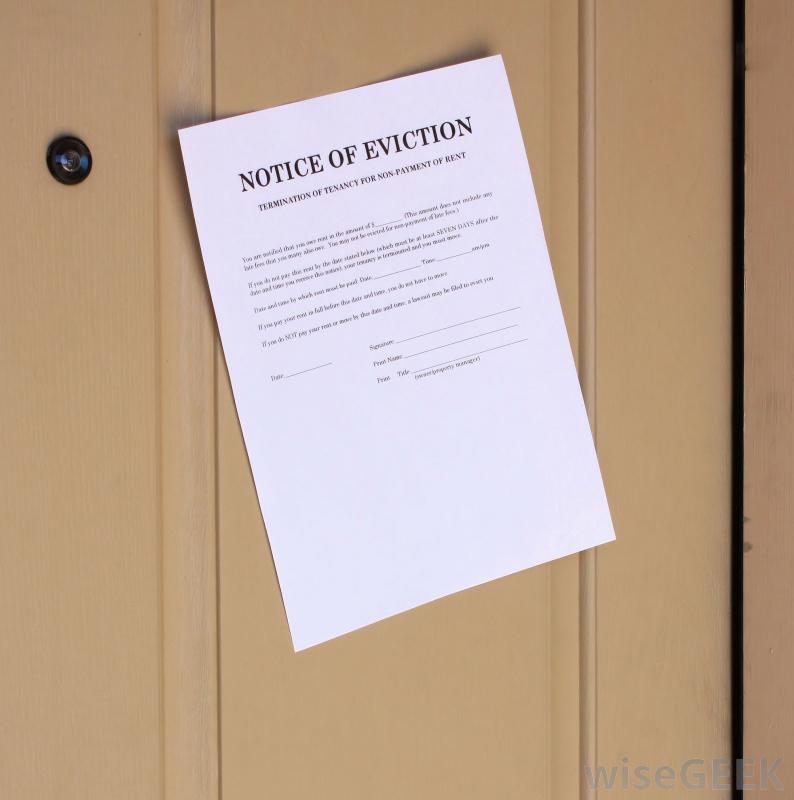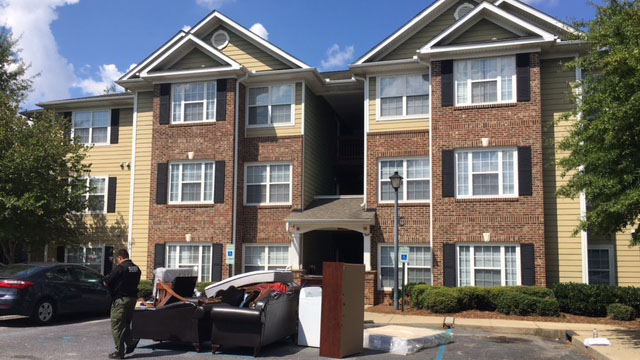HOW TO ANSWER YOUR EVICTION CASE
What to do if your being Evicted. ?
INTRODUCTION
You are being evicted. You use the word and you hear others use it, but what does it mean? Well, eviction is a legal way a landlord gets back possession of the apartment. Some of you may rent a duplex, a house, a condo or rent a trailer. We will use the word apartment as a convenience because it is easier.
To start an eviction, usually the landlord has to give you some kind of written notice. If you do not do what the notice requests or you do not leave, Then the landlord Can File an eviction lawsuit against you in County Court. You get to respond to the eviction by filing with the court a paper called an answer. Then you have a final hearing before a judge and you tell the judge what you put in your answer, And why you don’t feel that you should be evicted. The purpose of this is to help you prepare your own answer to the eviction.
NOTE: If you do not pay the rent or you do not move when asked to by the landlord, your landlord cannot change the locks, turn off the utilities, or do anything else which forces you to move out This is called an illegal eviction or a “prohibited practice” and is a violation of the Landlord /Tenant Act.
It can make your landlord liable to you for three times your rent, or actual damages, whichever is higher, and attorney’s fees and costs. Each time the landlord commits a prohibited act, it is a separate violation. For instance, if your landlord turns off your water one day, and then turns it on, and three days later changes your locks, that is two separate violations which you can sue for. Turning off the water makes the landlord liable for three times the rent and changing the locks makes the landlord liable for an additional three times your rent amount. If your landlord does any of these prohibited acts, you should see an attorney about obtaining an injunction to order the landlord to turn on the utilities or let you back in the apartment. If you don’t want to move back in but want to sue for damages, you can file a lawsuit yourself in Small Claims Court if you are suing for less than $5,000.00. Only a judge can order that you leave. The way the landlord asks the judge to do that, as we said, is to file an eviction lawsuit in County Court. You get a copy of the eviction lawsuit and you get to answer it, or in other words, tell the judge why you should not be evicted.
REASONS WHY YOU CAN BE EVICTED
In Florida there are certain reasons why you can be evicted: you did not pay your rent, you violated a lease provision, you were given a proper notice to leave and you did not, or your written lease expired you did not move. We will go over each one of these reasons separately and we’ll tell you what to look for so you know what to put in your answer.
- Non Payment of Rent
If you are being evicted for not paying rent, your defenses will depend on what class of tenant you are. If you are a private tenant and have a written lease, you need to read your lease to see how much time you are allowed to pay rent when you are given a written notice to pay rent. If it is not in your lease, or you have no written lease, then you must receive a written Three Day Notice to Pay Rent.
The Three Day Notice has to say the amount of rent that is owed and say that you must pay the rent within three (3) days or give up the apartment. The Notice also has to say the date of the third day which rent is due, and it also has to say that Saturdays, Sundays and holidays are excluded from counting the three days. The day you get the Notice does not count, the next day is day one. For instance, if you get a Three Day Notice to Pay Rent on Tuesday, Wednesday would be day one, Thursday day two, and Friday day three. Your rent is due Friday. Or if you get a Notice to Pay Rent on Thursday, Friday is day one, Saturday and Sunday do not count, Monday is day two, and Tuesday is day three, the day your rent is due. In most circumstances, the Notice can only ask for rent, not late charges or repair charges. If you did not get this Notice, or the Notice didn’t have all that it’s supposed to have, that may be a defense to your eviction for nonpayment of rent. Of course payment of rent is always a defense to an eviction for nonpayment of rent.
If you are in public housing and are being evicted for not paying rent then the requirement is different for you. You must get a Fourteen (14) Day Notice to Pay Rent.
The Notice must:
- state the amount of rent you owe;
- give the date by which you must pay rent or move out;
- must also advise you of your right to a grievance hearing if you dispute what is in the Notice;
- must advise you that you can examine any documents which the public housing authority has which relates to your eviction. If you live in Section 8 or other government subsidized housing , you have to look at your lease to see the amount of time you have to pay rent when you receive the Notice to Pay Rent. Usually a copy of the lease should be attached to the eviction papers. Maybe you didn’t pay rent because you are trying to force the landlord to make repairs. You can do that but first you have to send the landlord a written notice 7 days before the rent is due, stating the problems with the apartment and that you will not pay rent until the repairs are made. Then you have to save the rent. If you didn’t give the 7 day written notice, then in an eviction for nonpayment of rent the judge may say that you had no right to withhold the rent
2. Breach of Lease or Violation of Rules and Regulations
Maybe you are being evicted because the landlord says you broke the lease, violated some apartment rules, or mobile home park rule, or you are engaging in some behavior that violates county ordinances or is a threat to the health, safety and welfare of the other tenants. If you are a private tenant renting from a private landlord and you have a written lease, you should first check in your lease to see how long it says you have to correct a violation of the lease of a violation of rules and regulations. If you do not have a written lease, then under Florida law, the landlord has to give you at least 7 days written notice of the problem. The purpose of giving you the notice is so that you can stop doing what is being complained of. In legal terms, this is called “to cure”. You cure by stopping the behavior that the landlord says you are doing and which is a violation of your lease or other rules. For instance, you get a notice saying that your disabled truck parked in the parking lot is a violation of the rules and regulations. You move the truck, you have “cured”. Sometimes you haven’t done what is complained of in the notice, or you have done it but you don’t think it is a violation or you have stopped doing whatever it was that is complained of. That can be a defense. Also, the notice has to be specific. It cannot say you have violated Section 12 of the lease or you have violated park rule #3. It has to be specific and say how you violated the rule. If you live in public housing and what you or someone in your household is accused of actions that are
a threat to the health and safety of other residents, then you must be given a 7 day notice telling you that your lease is terminated. You have the right to a grievance panel hearing about the public housing authority’s decision to terminate your rental agreement, except if they are terminating your rental agreement because of criminal or drug activity.
If you live in public housing and what you or someone in your household is accused of is not a threat to the health and safety of other residents, then the public housing authority has to give you a 30 day notice telling you to stop the behavior, or they will terminate the rental agreement. If you live in Section 8 housing or other government subsidized housing, once again, you have to look at your lease to see how much time you are entitled to cure.
Termination of Rental Agreement
Finally, you can be evicted because the agreement you made with the landlord to live in the apartment has been terminated or ended. If you are a private tenant and you have a lease, this means that the lease has expired and you have continued to stay on in the apartment and you and the landlord has not made any subsequent agreements.
If you are a private tenant renting from a private landlord and you have no lease, then the landlord has to give you written notice to make you move. The amount of notice depends on how often you pay your rent. If you pay rent weekly, you have to get the written notice 7 days before the rent is due. If you pay your rent monthly, you have to get the written notice 15 days before the rent is due.
Miami Beach has a special law that requires landlords to give tenants 30 days written notice if the tenant has an oral month to month agreement, or has a written lease without specific duration where they pay rent every month.
In Florida, if you live in private housing with no written lease, the landlord can evict you for any reason, as long as it is not discrimination because of race, creed, color, sex, national origin, age, handicap, marital status, HIV status or because you have children. A landlord can evict you just because they don’t like you. And it is not a legal defense to say that you are sick with a doctor’s note or you have children or you have no place to move. However, you can say as a defense that the landlord is trying to evict you in retaliation. This is illegal. Retaliation means the landlord tried to raise
the rent, or evict you, or is treating you differently, because you complained to a government agency for some reason. For instance, you called the housing inspectors because the toilet was backed up and the landlord wouldn’t fix it. Or it could be that the landlord is evicting you because you have asserted your rights as a tenant. For instance, you organized all the tenants in the building to go to the landlord about getting the broken elevator fixed. If you are in public housing you can only be evicted for certain reasons, such as you did not pay your rent or you violated the lease or some rule and regulation. If you are in Section 8 or other government subsidized housing, you have to read your lease to see in what circumstances a landlord can refuse to renew your lease or try to evict you.
III. HOW TO WRITE YOUR ANSWER
ATTACHED IS A FORM THAT CAN BE USED TO PREPARE YOUR “ANSWER”.
You need to first write the case number and the names of the parties on the top of the paper. That is called the “style of the case”. The landlord is the Plaintiff, you are the Defendant.
Next you need to read the complaint to evict and respond to each of the paragraphs in the complaint. You respond by writing in your answer that you either admit or deny what is in each paragraph. For instance, paragraph (1) one may say you are the tenant. You should admit that if you are the tenant. Another paragraph says you owe rent or broke the lease and if you’re saying that is not true, you would deny that paragraph. After you admit or deny all of the paragraphs, then you write your defenses. For instance you could
write, “the landlord is retaliating because I called the housing inspector” or “I offered the landlord the rent on time but he wouldn’t take it”. After you write your answer, you sign it, including your name, address, and phone number. The rules of the court require you to send a copy of the answer to the landlord or the landlord’s attorney when you file it in court. At the bottom of the sample answer, you will see a section for doing that. You have the right to a jury trial on your eviction. You must write in the answer if you want a jury trial. But that is not a good idea if you are representing yourself, because it can get very complicated.
- WHEN AND WERE TO FILE YOUR ANSWER
Your answer is due in court on the 5 th day after the eviction complaint was personally served on you or a member of your household, or posted on your door.
Five days are counted just like in the Three Day Notice to Pay Rent. You don’t count Saturdays, Sundays, and Holidays. The day you are served does not count. The next day would be day 1. For instance if you are served on a Wednesday, Thursday is day 1, Friday is day 2, Monday day 3, Tuesday day 4 and Wednesday day 5. Your answer would be due in court by 4:00pm on the 5 th day. If you can’t remember when you were served with your eviction papers, take out your eviction papers and look at the top page on the papers. That is called a summons. If you look over to the upper right you will see the word “Summons”. Also, usually in that same area, the Sheriff has written or stamped
the time and date that they served you with this paper. The Summons comes with the eviction papers. The Summons is actually like an order from the court telling you to answer the eviction papers in 5 days. You should file your answer in the branch court where the landlord filed the eviction. You can tell the branch court by the two digit number at the end of the case number. It will say CC 05 or CC 20, etc. The branch court locations are at the end of this handout. When we talk about filing your answer it simply means to go up to the clerk at the counter at County Court and say “I want to file an answer to an eviction”. The clerk will either take your answer or direct you to another clerk who will. Always take the original answer and a copy. The clerk will file the
original in your court file and will stamp your copy with a date and the Clerk’s stamp. That copy you keep for your records. Now this is very important. You must pay into the registry of the court the rent that is due or ask the Court in writing as part of your answer, to determine how much rent is due. You must also ask the Court in writing to give you a hearing to determine how much rent should be paid into the court registry. If you are doing this, you would title your answer “Answer, Motion to Determine Rent and
Request for Hearing.” There is an outline included in this brochure. You must continue to pay the rent as it becomes due into the court registry, while the lawsuit continues.
NOTE: If you fail to pay the rent into the registry of the court or fail to file a written request (motion) to determine the amount of rent due and request for hearing, within (5) days, excluding Saturdays, Sundays and legal holidays after the date you receive the eviction lawsuit, you have waived your defenses other than payment and the landlord automatically wins. If you do file a motion to determine the amount of rent due, documentation is required to support 5your argument that the rent that the landlord is seeking is an error. For instance, if you say you paid,
then attach a copy of your receipt. If you say you are withholding rent to force repairs, then attach acopy of your rent withholding letter to your landlord.
If you live in Section 8 or other government subsidized housing , you are required to deposit only that portion of the rent you are responsible for under your subsidized program. If you are being evicted for nonpayment of rent and you asked the Court to determine how much rent you owe or you answered that you paid, the Court may hold a hearing to decide how much rent should be posted or may issue an order based on what the Court reads in your answer.
- Final Hearing or Trial
After you file the answer, the landlord or the landlord’s attorney or the court sets the final hearing date. The final hearing, which is actually your trial, will be heard at the same place where you filed your answer. Before the final hearing you will probably go to “Mediation”. This is a meeting between you and the landlord and the landlord’s attorney and a mediator. The mediator is not an attorney and is not a judge. The mediator is a person trained to help you and the landlord work out your problem. Mediation means that you try to compromise. You give up a little of what you want and the landlord gives up some of what he wants to make a settlement. You should always try mediation. If you reach an agreement at mediation, then you sign a paper called a “Stipulation” and then the judge signs it too. It is the final order in your case. If you and the landlord cannot agree then sometimes you may go right to your trial. Trials may be held in the judge’s chambers which are like the judge’s office. The judge sits at the head of a table at a desk. You and the landlord’s attorney and the landlord sit on either side of another table extending out from the judges desk. Other times the trials are held in the courtroom.
The landlord goes first and presents his case. You can question the landlord and his witnesses. This is called cross examination. Then when the landlord is done you present your case. You can have witnesses too. The landlord or his attorney can question you and your witnesses. The judge then decides. If the judge rules for you, there is no eviction. However, sometimes the judge may put conditions in the ruling. Make sure you understand them before you leave. If you lose the Court hearing or if you did not answer the lawsuit in the first place, the Court will enter a final judgment of eviction. If you do not move out the Court will tell the Sheriff’s Office to move you and your family and everything you own out of the place where you are living. The notice that the Sheriff gives you is called Writ of Possession. It gives you 24 hours notice to move out. If have not moved out by the time the Sheriff comes back, the landlord or the landlord’s agent may remove any property of yours to the property line. They can do this whether you are home or not, have children, or are sick. The law on evictions is found in Chapter 83 of the Florida Statues, Part 11.
If you lose the eviction, you have 30 days to appeal. If you lose and the landlord has an attorney, the judge can make you pay the landlord’s attorney fees and the landlord’s costs. If the landlord had no attorney, you can still be ordered to pay the landlord’s costs.
- MOBILE HOME OWNERS
If you own a mobile home owner in a mobile home park with 10 or more lots rented, and the landlord is trying to evict you from the mobile home park, some special laws apply to you. If you are being evicted for nonpayment of lot rental, then the mobile home park owner must send you a written demand by certified or registered mail, return receipt requested, giving you 5 days in which to pay the rent. The same notice must also be posted on your mobile home. If you are able to pay the rent within 5 days you should do so. If you are unable to, and the landlord files an eviction in Court, the law says that the landlord should accept the rent from you, along with late charges, as long
as you pay court costs and attorney fees. However, you can only do this twice. The third time your case goes to court because of nonpayment of rent, the landlord does not have to offer you a chance to pay the rent, late fees, attorney’s fees and costs to avoid the eviction. When you own your mobile home and rent the lot, in most instances you have to get two notices of any violation of your lease or park rules. The first notice has to be given to you within thirty (30) days after you violate the lease or rule or regulation and it has to give you seven (7) days to cure. Only after you violate the same rule or regulation or your lease a second time within the same year, can the landlord file an eviction.
If you are accused of any actions that endanger the life, health, safety or property of the park residents, then the park owner has to give you a 7 day notice terminating the rental agreement. The law on eviction of mobile home owners is found in Chapter 723 of the Florida Statutes.
FINDING A PRIVATE ATTORNEY
There are several ways you can find an attorney who may be able to assist you.
- Ask your friends and family if they have an attorney they would recommend.
- Search on NationalEvictions.com – We have one of the largest Lawyer Referral Service’s online at www.nationalevictions.comunder the tab Listings click on “LAW FIRMS” (Find Law Firms in the State / County you live in)
Tags:
Eviction Information,
Florida Eviction Articles
 Landlord-tenant court is a notoriously nasty place. In New York, for example, housing court has become a tool of landlords trying to push out rent-controlled tenants. In Philadelphia, one out of every 14 tenants faces eviction every year, and those fights play out in housing court.
Landlord-tenant court is a notoriously nasty place. In New York, for example, housing court has become a tool of landlords trying to push out rent-controlled tenants. In Philadelphia, one out of every 14 tenants faces eviction every year, and those fights play out in housing court.







 We have seen some Notices that were defective Landlords when giving the Tenant a Notice to Quit or Other Notices there are times set for each notice.
We have seen some Notices that were defective Landlords when giving the Tenant a Notice to Quit or Other Notices there are times set for each notice. 










